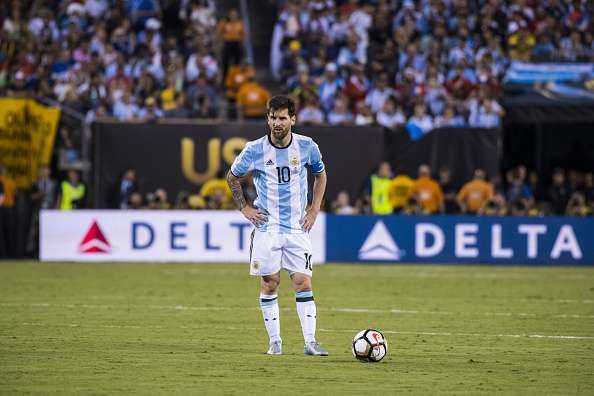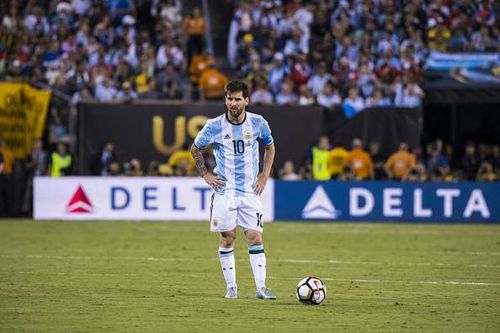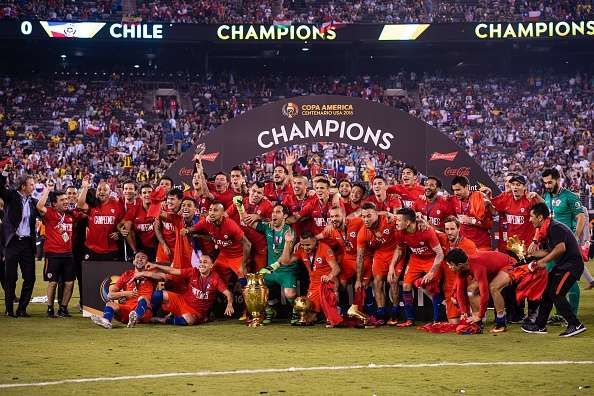
Why the timing of Lionel Messi’s retirement was unfair on Chile

The media frenzy around Argentina’s Lionel Messi, arguably the best footballer of the modern generation and one of the best to have ever kicked the ball, announcing his retirement from International football after a disheartening loss to Chile in the finals of the centenary edition of the Copa America 2016 tournament, was but natural. After all, if a player who has been voted the best footballer in the world for a record five times and was adjudged the best player of the last FIFA World Cup, announces international retirement at 29, an age when professional footballers are known to be at the peak of their prowess, it does call for global headlines.
The news was followed by calls of a rethink from no less than the President of Argentina, Messi’s legendary countryman Diego Maradona and from a multitude of his fans and admirers across the globe.
It also fueled speculation on all not being well within the Argentine national team as also talk of others in the squad following suit. Even the media in Argentina was blamed with having gone overboard in criticising Messi’s record in national colours. And last but not the least twitter hashtags created by fans crying out #StayMessi and #DontGoLeo were trending for days. That big it was!
Also read: Life after Messi. What next for Argentina?
Nothing wrong with that, one would say. Only that in all of this din around his retirement, the real sports story, that of Chile assuming the title of the new kings of Latin American football, got lost somewhere. And that is not fair.
The much-needed overhaul of Chilean football reaps benefits
The La Roja (The Reds) as the Chilean national football team are affectionately referred to by their fans because of the dominating color of their jerseys, today are ranked fifth in the world rankings, down from an all-time best of three that they had reached as recently as May of 2016. But the situation was entirely different just under a decade ago. Brazil and Argentina were still the undisputed kings of South American football.
Chile were outside the top 10 in the world and just as they were trying to rebuild a team after the generation which boasted of their greatest goal scorers in Marcelo Salas and Ivan Zamorano had retired, six first team players had to be suspended for as many as 20 international matches due to disciplinary reasons during the Copa America of 2007. They included their captain Jorge Valdivia as well as Pablo Contreras, among Chile’s all-time most experienced campaigners. The six were also condemned to a life-long national team captaincy ban. The coach also became a casualty of Chile’s poor show during the tournament.
The overhaul began ironically under the famous Argentine coach Marcelo Bielsa, who was assigned the reigns of La Roja in 2008. Since then Chile have not only qualified for two back to back World Cups but have also reached the round of 16 on both occasions. More importantly, they were playing attractive football which was endearing them to fans world over. The loss to hosts Brazil in the 2014 World Cup in a penalty shoot-out was universally acknowledged as the better team not having finished on the winning side.
Also read: Defender Jara says Chile should set sights on World Cup
Chile continued to display an impressive brand of football and players like the top goal scorer of the 2016 Copa, Eduardo Vargas, their second most capped player as well as second highest goalscorer Alexis Sanchez and Arturo Vidal were proving that this Chilean squad were second to none.
The hard-work and commitment of the Chileans finally bore fruit with their first ever Copa triumph in 2015, when they beat Messi’s Argentina on penalties after a barren 120 minutes of football. In this year’s centenary edition,

Chile took the exact same route to get the better of Argentina again in the finals to conclusively prove that the 2015 triumph was no flash in the pan. The kind of football Chile was now capable of playing was evident from their 7-0 rout of Mexico in the quarter-finals, emphatically halting the Central American nations 22-match unbeaten run. The Chilean national football team were now undisputed kings of Latin America.
Given this meteoric rise of a comparatively tiny footballing nation (Chile has a population of about 18 million people), one would have expected a lot of celebration and romanticizing in the public spaces that matter, on the advent of a new star on the footballing horizon. But Lionel Messi had other ideas. “For me the national team is over. I've done all I can, it hurts not to be a champion,” he said. "I don't think I will (return). I made up my mind. I did everything possible to win and it's done.” The news hit the world like a tsunami and it was all about Messi from them on.
It is difficult to believe in today’s day and age that a 29-year-old international superstar, would not be aware of the consequences of making a statement like that, just after the final of a widely watched tournament.
He would have known that he would completely dominate the media spaces by saying what he said. And therefore, he should have exercised greater discretion as a footballer in choosing the time to make such an announcement, if at all he had to make it.
He should have known that night, along with a few following ones, should have belonged to Chile. They had won fair and square and richly deserved to be the focus of all the adulation. Instead, he chose to steal the limelight. Not that he does not get enough of it already and will continue to do so. The emergence of Chile as a top footballing nation should have been the story. Instead, Messi became the story.
He should have been more gracious that night. It would not have hurt if in the statement above, a congratulatory line could have been reserved for Chile.
The game is bigger than an individual
The other disappointing aspect was the choice of words. “I have done all I can….”, “I made up my mind….”, “I did everything possible to win….”. A player of Lionel Messi’s caliber and stature should know that the sport of football, unlike tennis or fencing, is not about the individual. It is not about him alone.
The sport is much bigger than anybody. Is he trying to say that the other members of the Argentine national squad did not do everything possible to win? Would Maradona be able to win the World Cup without the likes of Valdano and Burruchaga among others for assistance? Would Argentina be able to reach three finals on the trot without the services of players like Di Maria, Higuain and Aguero?
“I made up my mind,” he says right after the final loss. Did you consult your team-mates, coach before taking such an important decision? What about the fans? Messi would be 31 during the next FIFA World Cup to be played in Russia. Is it fair on his part to deny Argentinian fans the chance to field their best players to win the World Cup? Something which they haven’t done in three decades. And what about the sponsors? Did he not feel it appropriate to consult his sponsors, who have been supporting him all this while?
There is absolutely no doubt that Lionel Messi is a footballing phenomenon. However, it is also true that footballers come and footballers go, but the game goes on forever. Anybody who thinks he is greater than the traditions and spirit of the game needs counseling.
The damage has been done and Chile has been denied their moment of glory already. What now needs to be done is reinstate the spirit back into the game. The spirit of ‘Joga Bonito’ (play beautiful) that binds football lovers across the world. And individuals too full of themselves can never be part of this spirit.